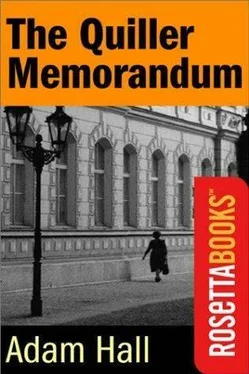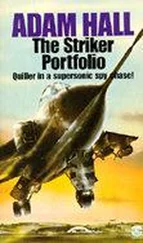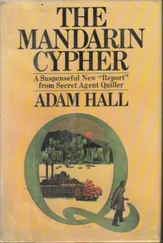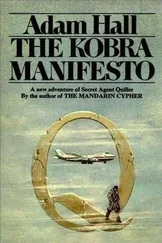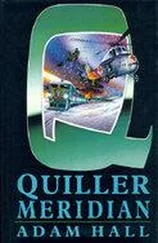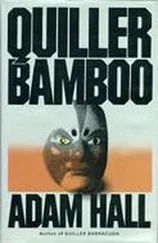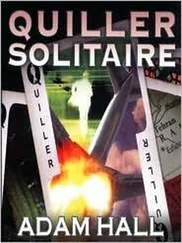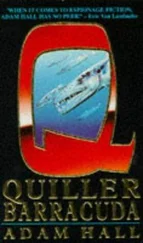Adam Hall - The Quiller Memorandum
Здесь есть возможность читать онлайн «Adam Hall - The Quiller Memorandum» весь текст электронной книги совершенно бесплатно (целиком полную версию без сокращений). В некоторых случаях можно слушать аудио, скачать через торрент в формате fb2 и присутствует краткое содержание. Жанр: Детектив, на английском языке. Описание произведения, (предисловие) а так же отзывы посетителей доступны на портале библиотеки ЛибКат.
- Название:The Quiller Memorandum
- Автор:
- Жанр:
- Год:неизвестен
- ISBN:нет данных
- Рейтинг книги:5 / 5. Голосов: 1
-
Избранное:Добавить в избранное
- Отзывы:
-
Ваша оценка:
- 100
- 1
- 2
- 3
- 4
- 5
The Quiller Memorandum: краткое содержание, описание и аннотация
Предлагаем к чтению аннотацию, описание, краткое содержание или предисловие (зависит от того, что написал сам автор книги «The Quiller Memorandum»). Если вы не нашли необходимую информацию о книге — напишите в комментариях, мы постараемся отыскать её.
On its publication in 1966, THE QUILLER MEMORANDUM received the Edgar Award as best mystery of the year.
The Quiller Memorandum — читать онлайн бесплатно полную книгу (весь текст) целиком
Ниже представлен текст книги, разбитый по страницам. Система сохранения места последней прочитанной страницы, позволяет с удобством читать онлайн бесплатно книгу «The Quiller Memorandum», без необходимости каждый раз заново искать на чём Вы остановились. Поставьте закладку, и сможете в любой момент перейти на страницу, на которой закончили чтение.
Интервал:
Закладка:
Luminous dial at 05.03. Fifty-seven minutes left.
Oktober-thinking was no go. Even he was sometimes faced with a choice of decisions. He – or his Reichsleiter would now be deciding whether to let me use the car (so that they could tag me and see me signal Control) or to switch off the risk the moment I got into the car (so that they could relax and think out a new way of locating my base – perhaps using my successor).
The night was still calm. Very far away the throb of a Diesel truck sounded; even more distantly there was a shunt going on in the freight yards. In my area there was total silence. I stood between the gates with the horror coming into me slowly and when I tried to keep it back it made ever faster return. The left eyelid began.
They had been called off.
Nobody, not even the least efficient field-scout in the most tumble-down intelligence service, could fail to see me framed in these gates with the light of a street-lamp on me. And to see me they must show themselves, by however small a fraction. The terrain was bare and geometrical, a pattern of ground-surface, walls, doors, windows and roofs; and I gave it a one-hundred-per-cent examination. There was no window open even an inch. Every door was shut. The lamp-stanchion was less than a foot in diameter except at the base, which stood two feet from the pavement no cover. The outline of the estate-car parked on the other side of the street was utterly distinct and unspoiled. The horizon line was unbroken from roof to roof.
In ten minutes I had re-observed. Nil.
Known conditions had ceased.
Eliminate two considerations. (1) They were not waiting for me farther off, at each end of the street, because there was no absolute guarantee of picking off the driver of a car accelerating at full bore and tyre-targets were tricky. The 230SL would be pitching up eighty k.p.h. in third gear by the time it reached either end of this street. (2) They wouldn't be set up to fire from behind a closed window (where reflection could mask them in this light), because deflection is always a risk, the structural quality of the glass being variable. Nor would they be absolutely certain of drilling the pagoda-top roof dead on target from any height. If they were going to fire on me from a closed window they'd do it now, because the door of the garage had raised enough sound to travel through the glass of any window in this area and they'd know my intention: to use the car.
They had been called off.
The eyelid was bad now so I stopped thinking and moved back across the yard and went into the garage through the wide-open doors. The same factors applied: there was no increased risk in walking through these doors if in fact they'd posted a man in here with orders to kill me off if I tried to get into the Mercedes.
No shot. No sound. No sign.
The awful thing was that I wanted badly to get clear and they were going to let me and I didn't like it or trust it.
Perfectly still. Breathe shallow. Examine.
Sound: the last of the Diesel throb, fading north. Metal on metal from the freight yards. All.
Vision: blurred outlines, three cars, oil-drum, wall-map, tap and trough. All.
Scent: petrol, oil, rubber, sacking, timber. All.
Nothing out of place.
Only the voice inside me saying I don't like this, I don't like this. Shuddup. Brain-think not stomach-think, getting old, old enough to die.
Luminous dial at 05.24. Thirty-six minutes to go.
Brain-think: make all usual checks and then re-check; and then get out, win or lose.
I travel light but sometimes life or lesser but important things depend on vision at night so I carried a pen-torch with three long-life cells and an inverse lens for needle focus. The hood slid up without a click on the felt-lined barrel. The thin beam began moving about. Doors not tampered with. Check interior: all switches and levers in position as left. No foreign odours.
Ten minutes on the interior. Then I opened the luggage compartment and checked contents. Cleared. The engine cover made a slight noise because of the sprung catch and I stood still for three minutes listening.
The ray probed the engine. Check for recently-laid wiring, unfamiliar components, foreign odours. Cleared.
I stood for a minute to steady the breathing. Sweat was gathering at the waist. The knee pulsed. Eyelid calm because action was soothing the nerves.
Right – risk the rest and get in and drive like hell and hope for luck.
Never throw blind.
Back to the interior, checking beneath the facia panel for new wiring at the ignition and headlamp switch-points. Cleared.
Keep on working, take advantage of the analogy: I had thought of an analogy, excellent piece of brain-think. The ray probed along the cement floor, picking up chips of stone, ancient splinters rotted dark, the tarnished brass terminal of a sparking-plug, Bosche-type.
Then I got down flat on my back and pulled myself under the chassis and found it at once.
23 : SIGNAL ENDS
The needle ray of light made a circle on the plastic casing. The brass posts of the solenoids were flush-cut and the light gave them a gold shine. There was a slinging-eyelet cast integrally. Apart from these three features it was simply an elegant oblong six-by-three, about the size of a small pocket-lamp.
It was Japanese. The last time I had seen one was in Paris in ‘59 when the Deuxieme Bureau handed over the FLN problem to the Main Rouge. It was the same type of bomb that they had used to remove Puchert, and it was the same method: he was blown to pieces in his car on the Guiollett-strasse, Frankfurt, at 9.15 a.m., March 3.
Now I was looking at one of these things again. Small, compact, beautifully-moulded, it could rock a street.
I had expected to find it – and had looked for it – because of the analogy, which was: they've cleared out of here as if there were an unexploded bomb in the place.
The chill of the concrete was seeping through my coat into my shoulder-blades but I lay there for half a minute to do some thinking. Oktober was a human computer and this idea would appeal to him. He didn't trust humans who were not computers. He had envisaged the remote possibility of my being unobserved when I finally got round to using the Mercedes in a last attempt to break clear. The orders were that if I had made no signal by first light I was to be switched off. Declining to chance even a remote possibility of failure in this, my death was to be arranged with precision: it was to be automatic.
The sweat was dangerous now and I wiped my hand on my coat before reaching up and taking the bomb from its perch on top of the exhaust-pipe. The set-up was that when I started the engine the vibration of the pipe would dislodge the bomb within the first few minutes of driving and it would hit the ground. Even at high speed the thing must fall immediately below the car.
I held it snug on my chest and slid out from under, standing up and listening from sheer habit. The night was mine.
The lock-ups were communal, with only three main partitions six feet high, and there was a side door at the far end, so I checked the gear for neutral and started the engine, moving round to the front of the car and resting the bomb on the slope of the bonnet about a third of the distance from the front edge, where the smooth plastic would slide on the smooth cellulose, given time. The engine was cold and the vibration at its highest. I stood and watched the bomb in the light of the torch. In fifteen seconds it began to slide and I kept my hand ready in case. Twenty seconds and it sped up and reached my hand.
I wanted roughly one minute, so I put the bomb a couple of inches higher than the first time and left it there, climbing the first partition and dropping over, climbing the second and dropping, kicking over an oil-tin and disregarding the noise, climbing the third partition and making for the side door. It had a Yale-type lock with a knurled knob and there was an interior bolt in addition; I had oiled them both when I had seen to the big double-doors two days ago.
Читать дальшеИнтервал:
Закладка:
Похожие книги на «The Quiller Memorandum»
Представляем Вашему вниманию похожие книги на «The Quiller Memorandum» списком для выбора. Мы отобрали схожую по названию и смыслу литературу в надежде предоставить читателям больше вариантов отыскать новые, интересные, ещё непрочитанные произведения.
Обсуждение, отзывы о книге «The Quiller Memorandum» и просто собственные мнения читателей. Оставьте ваши комментарии, напишите, что Вы думаете о произведении, его смысле или главных героях. Укажите что конкретно понравилось, а что нет, и почему Вы так считаете.
